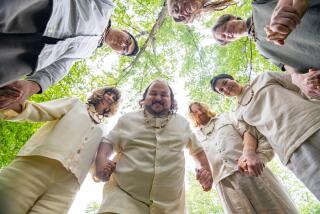THE CAREFUL MAPPING OF A YOUNG COMIC’S CAREER
When fans describe comedian Brad Garrett as a “big talent,” they’re expressing more than just a cliched, show-biz assessment. That’s because Garrett stands 6-foot-9, or as he puts it, “I’m a little bit taller than your average medical building.”
It’s not surprising that the towering comic, who opens a three-night stand at the Laff Stop in Newport Beach tonight, includes a chunk of height-oriented material in his routine. But Garrett doesn’t build his act around that topic.
“I really don’t. I do think it’s something unique, especially in comedy. So I think it would be strange to go onstage and not talk about it,” Garrett said recently while lunching in a West Hollywood restaurant.
“I talk about it for 10, maybe 15, minutes of my act. And that’s usually more about the inconveniences of being tall, as opposed to just tall jokes.”
Garrett, 25, has worked most of the key comedy clubs across the country. He’s also performed in showrooms and medium-sized concert halls, opening for such acts as Crystal Gayle, Randy Newman and the Beach Boys, and has appeared three times on the “Tonight Show.” Forthcoming bookings include shows in Atlantic City and a Las Vegas appearance at the Desert Inn in Las Vegas.
These accomplishments are largely the result of a step-by-step career strategy mapped out by Garrett’s manager, Judy Thomas. When Garrett first hooked up with Thomas almost six years ago, he was working as a waiter. At that time, he had five minutes of material and minimal performing experience.
Thinking back to those humble beginnings, Garrett said, “Judy has been great at guiding me, keeping me out of the wrong place at the wrong time, and in the right place at the right time. A lot of it was knowing when to do what.”
According to Thomas, the first order of business in building Garrett’s career was “what’s called playing the living room.”
“Brad would stay in the living room (of my home) for a few hours a day and perform for whoever would walk in: exterminators, my other clients, the dog,” Thomas said.
Later, having developed more material--and confidence--Garrett left the “living room” for occasional spots at clubs like the Ice House in Pasadena. But unlike many young comics, he didn’t scramble for performance time at the Comedy Store or the Improvisation, Hollywood’s most prestigious comedy venues.
Thomas felt that such ventures might prove counterproductive. “On any given night, a producer or somebody could walk in, you could be trying out some new stuff, maybe not be that good--and be written off in five seconds,” Thomas said.
So Thomas sent Garrett to New York, where the curly-haired comic worked on his material--and presentation--at such comedy clubs as Catch a Rising Star and Dangerfield’s. He later made his television debut on the “Norm Crosby Shop.” Thomas’ strategy seemed to be paying off: When Garrett (who lives in West Hollywood) returned to the Southland comedy circuit, he climbed onstage as a solid stand-up performer. And another television opportunity surfaced, this time on Showtime’s “Laff-A-Thon.”
It was yet another show--something Thomas hadn’t penciled into the game plan--that enabled Garrett to make a dramatic career breakthrough. He auditioned, reportedly along with 2,500 other comics, for the comedy competition of “Star Search,” a glitzy talent contest hosted each Sunday by Ed McMahon.
He not only earned a slot on the program, but when the last joke was told in February, 1984, Garrett had won the competition. He pocketed $100,000 in prize money, performed with other “Star Search” winners at Carnegie Hall, and within six weeks had his first booking on Johnny Carson’s show.
Now, Garrett and Thomas agree, the next big challenge is to parlay the exposure and career momentum into a full-time job on television. Garrett, who said he’s considering appearances in some pilots, among other possibilities, is trying to sell “Two on the Ground,” a new show he created and wrote. He described the program as “an off-the-wall, dry takeoff on all those evening magazine shows.”
But Garrett’s ultimate goal is to host a late-night talk show.
The way Thomas sees it: “. . . Brad would eventually like to sit behind a desk somewhere and be the person.”
Added Garrett: “I think good hosts are a dying breed. So that’s what I would really like to do. That would be ideal.”
More to Read
The biggest entertainment stories
Get our big stories about Hollywood, film, television, music, arts, culture and more right in your inbox as soon as they publish.
You may occasionally receive promotional content from the Los Angeles Times.










